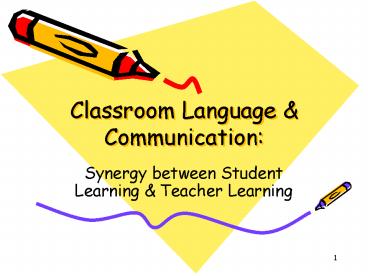Classroom Language - PowerPoint PPT Presentation
1 / 36
Title:
Classroom Language
Description:
Title: Teacher s Control of Knowledge Author: ricky wong Last modified by: TALBA Created Date: 9/26/2005 3:48:46 PM Document presentation format – PowerPoint PPT presentation
Number of Views:2064
Avg rating:3.0/5.0
Title: Classroom Language
1
Classroom Language Communication
- Synergy between Student Learning Teacher
Learning
2
Does this sound familiar to you ?
What I have learnt has all been given back to my
teachers!
3
Buzz
- What is Learning?
4
- Dictionary definition for reference
- to get knowledge or skill in a new subject or
activity (Cambridge Advanced Learners
Dictionary) - to acquire knowledge or skill in (Webster
Dictionary)
5
- In any real learning it is not just a matter of
adding new knowledge what we know already
becomes changed (Barnes, 1992 83) - Learning existing knowledge new knowledge
6
It is a matter of how much we UNCOVER, not
COVER!
7
Classroom
8
Classroom
- Definition
- Classroom a room in which a class of students
is taught - (Webster Dictionary)
9
Buzz
- Try to cast your mind back to your own
experience as a learner in school - What words would you associate with a classroom?
- What are the advantages and disadvantages of
learning in a classroom?
10
Knowledge
11
Bellinger, et al, 2004 elaboration based on
Ackoff, 1989
Data simply exist with no significance beyond
its existence (in and of itself) Information
data given meaning by way of relational
connection. This "meaning" can be useful, but
does not have to be. Knowledge the
appropriate collection of information, such that
it's intent is to be useful.
12
Ackoff, 1989 (cited in Bellinger, et al, 2004 )
13
Assimilation of knowledge
14
Language enables reflection!
Assimilation
15
Question
- How do we learn to become a learner / teacher?
16
BuzzAssimilation of Knowledge
Please use a diagram to depict the
relationship between a) Old experience b)
New experience c) Words
17
Assimilation of Knowledge
accommodation /construction
new information received
old knowledge
newly constructed knowledge
(BEd 4)
18
(PDC 2006)
19
(PDC 2006)
20
Speech, while not identical with thought,
provides a means of reflecting upon thought
processes, and controlling them. Q. Do you see
classroom talk as a dimension to optmize learning
resources?
21
- Language allows one to consider not only what
one knows but how one knows it the strategies
by which one is manipulating the knowledge, and
therefore to match the strategies more closely to
the problem. (Barnes, 1992)
22
Drawers of Knowledge
The teachers drawer
The students drawer
23
Connections
- Its very important to recall their past
experience through activities/questions/picturese
tc - Students always learn best when they explore BOTH
outside their mind and into their mind.
24
Students Language Final Draft vs Exploratory
Speech
- Final draft language which amounts to a formal
completed presentation for teachers approval - Exploratory Speech Ss rearrange thoughts during
improvised talk
25
Why is exploratory speech so important?
People are intrinsically motivated according to
the right mix of familiar with unfamiliar. (Biggs
,1995,P.90)
- Intrinsic motivation is an immensely more
powerful spur to learning than any extrinsic
rewards (Barnes,1992)
- Open the right drawer
- Mixing of the new with the olds.
26
- Exploratory speech ? explore into the mind and
explore into the new knowledge - Provide a medium for interaction between previous
knowledge and the new information - Language which are under-construction
- necessary for the construction of new
knowledge owned by students.
Ones mind/brain with previous knowledge
Exploratory speech
New knowledge
27
Teachers Language
- presenting vs sharing
Teacher
?
presenting
Use of terminology
- devaluate Ss action knowledge, - create
artificial dependency on school knowledge
28
Sharing
Co-construction accommodation
students
teacher
29
reply VS assessment
- If we are not trying to assess students,
Should we say.
??????
Yeah! Excellent! You did it really well!
30
What will be resulted from..
- judging (as an authority) vs encouragement (as a
fellow)
Final draft closed discussion no knowledge
accommodation
Exploratory reflection stimulation open
discussion previous knowledge explored new
knowledge accommodated
31
Getting to know ourselves better
- From what we have chosen to symbolize a teacher
and a student, we can see our attitudes towards
ourselves as a teacher and our students. - It also reflects how we see teacher-student
relationship.
32
Teachers Roles
- intimate audience vs distant audience
- supportive vs non-supportive
- engagement vs control
33
Towards Co-construction of Knowledge
- X T uses language to talk
- X Ss use language to listen
- v Both T Ss use language to think!!
- Manipulate thoughts with language!
- World receiver ? world maker!!!!
34
- Language as a Major Tool for Curriculum
Development - Who owns the curriculum?
- Who determines what to teach?
- Who determines how to teach?
- What is the examination assessing?
35
- Do you want to be a learner / teacher of today,
yesterday or tomorrow?
- Aware of different types of learning various
approaches to reach them - Develop a habit of reflection which opens up
opportunities to improve teaching learning
36
References
- Ackoff, R. L. (1989), "From Data to Wisdom",
Journal of Applies Systems Analysis, Vol 16, 1989
p 3-9. In G. Bellinger, D. Castro A. Mills,
Data, Information, Knowledge and Wisdom, 2004.
Retrieved 18 September, 2005 at
http//www.systems-thinking.org/dikw/dikw.htm - Barnes, D. (1992), From communication to
curriculum. Portsmouth, NH Boynton/Cook
Publishers - Bellinger, G, Castro, D. Mills, A (2004), Data,
Information, Knowledge and Wisdom. Retrieved 18
September, 2005 at http//www.systems-thinking.org
/dikw/dikw.htm - Biggs (1995) Classroom Learning Educational
Psychology for the Asian Teacher. Prentice Hall
Ch.6 - Cambridge Advanced Learners Dictionary
- Webster Dictionary































